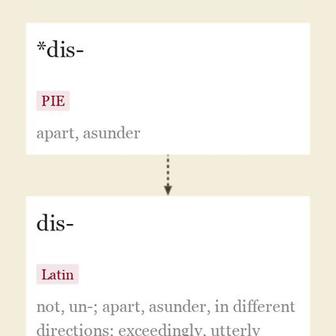dissuasion (n.)
early 15c., dissuasioun, "advice or exhortation in opposition to something," from Old French dissuasion (14c.) and directly from Latin dissuasionem (nominative dissuasio) "an advice to the contrary," noun of action from past-participle stem of dissuadere "to advise against, oppose by argument," from dis- "off, against" (see dis-) + suadere "to urge, incite, promote, advise, persuade," literally "recommend as good" (related to suavis "sweet"), from PIE root *swād- "sweet, pleasant" (see sweet (adj.)).
Entries linking to dissuasion
Old English swete, Mercian swoete, "pleasing to the senses, mind or feelings; having a pleasant disposition," from Proto-Germanic *swotja- (source also of Old Saxon swoti, Old Frisian swet, Swedish söt, Danish sød, Middle Dutch soete, Dutch zoet, Old High German swuozi, German süß).
This is reconstructed to be from the PIE root *swād- "sweet, pleasant" (source also of Sanskrit svadus "sweet;" Greek hedys "sweet, pleasant, agreeable," hedone "pleasure;" Latin suavis "pleasant" (not especially of taste), suadere "to advise," properly "to make something pleasant to").
As "pleasing to the ear" in Old English; in reference to jazz played at a steady tempo and without improvisation, by 1924 (opposed to hot). As "pleasing to the eye, beautiful, desirable" mid-14c. Of persons, "gracious, kind, having pleasant manners," in Old English. Words for "sweet" in the Indo-European languages typically are used in reference to the other sense as well, and in general for "pleasing."
Also "being in a sound or wholesome state" (mid-13c.), and, of water, "fresh, not salt" (late Old English). In old chemistry, "free from corrosive salts, acids, etc.," 1660s. Hence in the oil industry, in reference to petroleum, "free from sulfur compounds" (1919).
As "dear to oneself," sometimes sarcastic, by 1620s (take my sweet time). As an intensifier in coarse slang (sweet f-all), by 1958. Sweet Jesus as an imprecation is by 1932.
To be sweet on (someone) "infatuated with" is by 1690s. Sweet in bed (c. 1300) "has been used with various implications" [OED, 2nd ed. print 1989]. Sweet sixteen is recorded by 1767, in reference to the age, usually of girls.
Then come kiss me, sweet-and-twenty!
Youth's a stuff will not endure.
["Twelfth Night"]
A phrase, not a title. Sweet dreams as a parting to one going to bed is attested from 1897, short for sweet dreams to you, etc. Sweet-and-sour in cookery is from 1723 and not originally of Eastern dishes. Sweet nothings "sentimental trivialities," generally whispered in another's ear, is from 1900.
Sweet spot is from 1976, in reference to tennis rackets and golf swings. Sweet thing "desirable object or person" is by 1887. Sweet corn "sweetened maize" is from 1640s. Sweet singer "religious poet" is by 1550s, especially sweet singer of Israel, adapted from 2 Samuel xxiii.1.
The word in Chaucer's shoures soote (or schowres swoote) is Middle English sote "sweet to the senses," from Old English swot, a different form from the same Germanic adjective.
word-forming element of Latin origin meaning 1. "lack of, not" (as in dishonest); 2. "opposite of, do the opposite of" (as in disallow); 3. "apart, away" (as in discard), from Old French des- or directly from Latin dis- "apart, asunder, in a different direction, between," figuratively "not, un-," also "exceedingly, utterly." Assimilated as dif- before -f- and to di- before most voiced consonants.
The Latin prefix is from PIE *dis- "apart, asunder" (source also of Old English te-, Old Saxon ti-, Old High German ze-, German zer-). The PIE root is a secondary form of *dwis- and thus is related to Latin bis "twice" (originally *dvis) and to duo, on notion of "two ways, in twain" (hence "apart, asunder").
In classical Latin, dis- paralleled de- and had much the same meaning, but in Late Latin dis- came to be the favored form and this passed into Old French as des-, the form used for compound words formed in Old French, where it increasingly had a privative sense ("not"). In English, many of these words eventually were altered back to dis-, while in French many have been altered back to de-. The usual confusion prevails.
As a living prefix in English, it reverses or negatives what it is affixed to. Sometimes, as in Italian, it is reduced to s- (as in spend, splay, sport, sdain for disdain, and the surnames Spencer and Spence).
Trends of dissuasion
More to Explore
updated on September 04, 2018
Trending words
Dictionary entries near dissuasion
dissolution
dissolve
dissonance
dissonant
dissuade
dissuasion
dissuasive
distaff
distal
distance
distant

